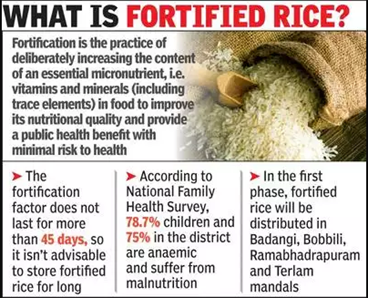Government Approves Fortified Rice to Combat Nutrient Deficiency
Why in the news?
The Union Cabinet has approved the continuation of fortified rice supply under welfare schemes until 2028, aiming to reduce anaemia and micronutrient deficiency in vulnerable populations.
About the Cabinet Decision and Financial Commitment:
- The Union Cabinet, chaired by PM Narendra Modi, approved the supply of free fortified rice under PMGKAY and welfare schemes from July 2024 to December 2028.
- The initiative aims to reduce anaemia and micronutrient deficiency, with a financial implication of ₹17,082 crore, fully funded by the central government.
Fortified Rice Supply Chain
- Information and Broadcasting Minister Ashwini Vaishnaw mentioned that ₹11,000 crore was invested in developing the fortified rice supply chain.
- India now has 925 fortified rice manufacturers with an annual capacity of 111 lakh tonnes.
- Fortified rice includes kernels enriched with iron, folic acid, and Vitamin B12, as per FSSAI
Health Benefits and Nationwide Implementation:
- The nationwide implementation of fortified rice began in April 2024, achieving universal coverage across all government schemes by March 2024.
- According to NFHS-5 (2019-2021), anaemia remains prevalent in children, women, and men, exacerbated by deficiencies in iron, Vitamin B12, and folic acid.
- Rice fortification is recognized globally as an effective solution to combat micronutrient malnutrition, especially given that 65% of India’s population consumes rice as a staple food.
What is Rice Fortification?
- Definition (FSSAI): Increasing essential micronutrients in food to improve nutritional quality with minimal health risks.
- Example: Adding iodine and iron to edible salt.
- Rice Fortification: Combat malnutrition by fortifying rice with micronutrients (iron, folic acid, B vitamins, vitamin A, zinc).
- Rice is a staple food for two-thirds of India’s population.
- Per capita rice consumption:8 kg per month.
- FSSAI norms: 1 kg fortified rice contains iron (28-42.5mg), folic acid (75-125 mcg), Vitamin B12 (0.75-1.25 mcg).
- Technologies: Coating, dusting, extrusion (best for India). Fortified rice kernels are blended with regular rice.
About Vitamin B12 (Cyanocobalamin):
- Synthesised by bacteria and algae.
- Crucial for brain and nervous system function.
- Deficiency causes pernicious anaemia, often due to failure of absorption (lack of intrinsic factor).
Folic Acid (Vitamin B9):
- Natural form is folate; found in foods or supplements.
- Essential for pregnant women to prevent neural tube defects (e.g., spina bifida).
- High cases of neural tube defects in India, Southeast Asia, and parts of Africa (4.7-9 per 1000).
Sources Referred:
PIB, The Hindu, Indian Express, Hindustan Times




